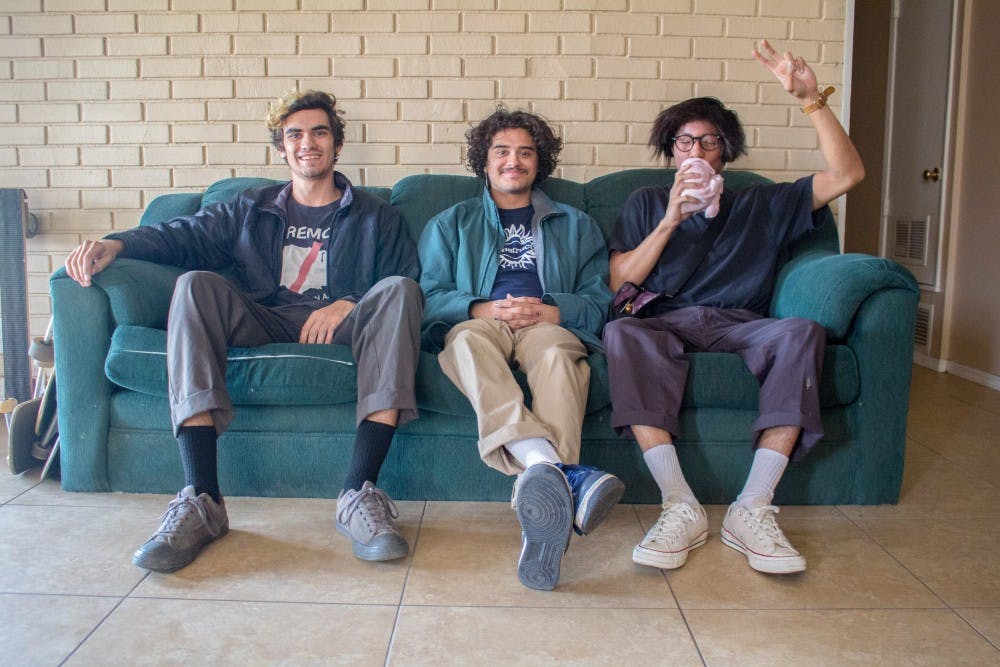Any confusion should be cleared up sooner rather than later – this house in Tempe is not a place for floaties and flip-flops but a place for skateboards and guitar amps.
Big Surf is a five-bedroom house venue in the heart of Tempe run by Craig Johnson, an ASU senior studying journalism.
Twice a month, the house is packed full of skaters and punks alike, with music fans crowding the living room and skaters making use of the skate ramp just outside the house’s back door.
The drummer of indie punk band Go Outside, Johnson said he began hosting house shows so his band could play shows without going through the difficult process of trying to book a venue. He's since tried to extend that convenience to other up-and-coming bands.
“It’s all based on giving a place of opportunity to people to play that might not have otherwise,” he said.
Aaron Ford, another resident of the Big Surf house, emphasized the importance of putting small local bands on their bills.
“We’ve had a lot of good local bands ... it’s all local here, man,” he said.
Beyond making shows more accessible for bands, Johnson said Big Surf also aims to make the local music scene more inclusive for all types of musicians and fans.
CJ Cordero, who graduated from ASU with a degree in genetics and is a former resident of the Big Surf house, said diversity has become more prominent in the local music scene in the past 10 years.
“It used to just be white dudes with long hair ... now it’s everyone: POC, femme, queer people,” he said.
Johnson said he actively tries not to perpetuate the problem of exclusiveness in the Tempe music scene, adding that "there have been issues in the past few years where people felt like they weren’t included and other things, and as soon as I heard it, I was like, ‘I don’t want to be that.’”
To further an atmosphere of inclusivity, Ford said the venue never asks more than $5 of an attendee, and that those who don’t have the money will still be welcome into the show.
“We’re not trying to run a business. We’re not trying to make money at all,” Johnson said. “If a band is driving here from across the country, it’s nice to give them some gas money to keep them going on their way.”
Compared to other house venues throughout the Valley, Big Surf has a low number of shows, but Johnson said this is a conscious and intentional choice.
“For us, it’s more about having good quality shows versus having a ton of shows,” he said.
Johnson said that Big Surf’s main focus, however, is creating and keeping a safe space for the music scene. Rules on the wall of the house tell concertgoers very simply not to "be a jerk" and to call Johnson if something goes wrong, followed by his personal phone number.
Johnson said he has no hesitation asking people who are making others uncomfortable or have made people uncomfortable in the past to leave.
“As the person who’s running the house, you just got to deal with it,” he said. “Whoever’s got to leave has to leave.”
Cordero said the process of deciding who to keep out of shows to maintain the overall safety of the venue is a difficult one.
“You have to synthesize with yourself and with the group, and you have to communicate with everyone to determine whether or not you want certain people at a show,” he said.
The best way to determine these things, Johnson said, is to take concertgoers' individual feelings and circumstances into account.
“I think the key to trying to ensure you have a safe place for people to go to is being as aware as possible of everyone’s sensitivities and everyone’s differences,” Johnson said. “And listening to what other people tell you about people in order to make a comprehensive group decision.”
Johnson said this complicated process of deciding who to include in the venue’s “blacklist” is the price of making sure people feel comfortable at his shows.
“I just want everyone to be welcome and feel like they have a place to come and enjoy music,” he said.
Reach the reporter at japere38@asu.edu or follow @jsphprzz on Twitter.
Like The State Press on Facebook and follow @statepress on Twitter.




